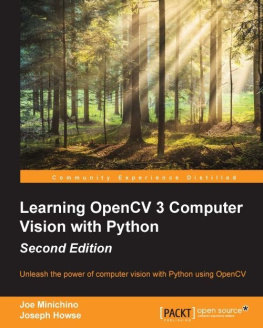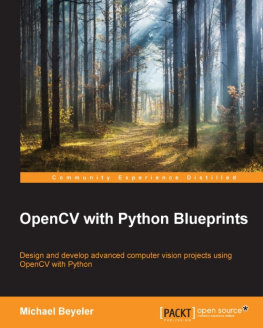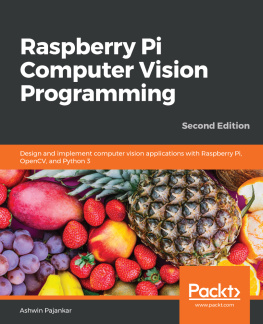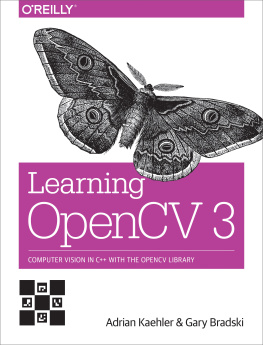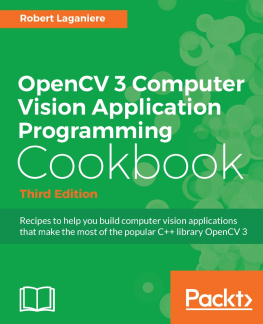About the Authors
Joe Minichino is a computer vision engineer for Hoolux Medical by day and a developer of the NoSQL database LokiJS by night. On weekends, he is a heavy metal singer/songwriter. He is a passionate programmer who is immensely curious about programming languages and technologies and constantly experiments with them. At Hoolux, Joe leads the development of an Android computer vision-based advertising platform for the medical industry.
Born and raised in Varese, Lombardy, Italy, and coming from a humanistic background in philosophy (at Milan's Universit Statale), Joe has spent his last 11 years living in Cork, Ireland, which is where he became a computer science graduate at the Cork Institute of Technology.
I am immensely grateful to my partner, Rowena, for always encouraging me, and also my two little daughters for inspiring me. A big thank you to the collaborators and editors of this book, especially Joe Howse, Adrian Roesbrock, Brandon Castellano, the OpenCV community, and the people at Packt Publishing.
Joseph Howse lives in Canada. During the winters, he grows his beard, while his four cats grow their thick coats of fur. He loves combing his cats every day and sometimes, his cats also pull his beard.
He has been writing for Packt Publishing since 2012. His books include OpenCV for Secret Agents , OpenCV Blueprints , Android Application Programming with OpenCV 3 , OpenCV Computer Vision with Python , and Python Game Programming by Example .
When he is not writing books or grooming his cats, he provides consulting, training, and software development services through his company, Nummist Media (http://nummist.com).
About the Reviewers
Nandan Banerjee has a bachelor's degree in computer science and a master's in robotics engineering. He started working with Samsung Electronics right after graduation. He worked for a year at its R&D centre in Bangalore. He also worked in the WPI-CMU team on the Boston Dynamics' robot, Atlas, for the DARPA Robotics Challenge. He is currently working as a robotics software engineer in the technology organization at iRobot Corporation. He is an embedded systems and robotics enthusiast with an inclination toward computer vision and motion planning. He has experience in various languages, including C, C++, Python, Java, and Delphi. He also has a substantial experience in working with ROS, OpenRAVE, OpenCV, PCL, OpenGL, CUDA and the Android SDK.
I would like to thank the author and publisher for coming out with this wonderful book.
Tian Cao is pursuing his PhD in computer science at the University of North Carolina in Chapel Hill, USA, and working on projects related to image analysis, computer vision, and machine learning.
I dedicate this work to my parents and girlfriend.
Brandon Castellano is a student from Canada pursuing an MESc in electrical engineering at the University of Western Ontario, City of London, Canada. He received his BESc in the same subject in 2012. The focus of his research is in parallel processing and GPGPU/FPGA optimization for real-time implementations of image processing algorithms. Brandon also works for Eagle Vision Systems Inc., focusing on the use of real-time image processing for robotics applications.
While he has been using OpenCV and C++ for more than 5 years, he has also been advocating the use of Python frequently in his research, most notably, for its rapid speed of development, allowing low-level interfacing with complex systems. This is evident in his open source projects hosted on GitHub, for example, PySceneDetect, which is mostly written in Python. In addition to image/video processing, he has also worked on implementations of three-dimensional displays as well as the software tools to support the development of such displays.
In addition to posting technical articles and tutorials on his website (http://www.bcastell.com), he participates in a variety of both open and closed source projects and contributes to GitHub under the username Breakthrough (http://www.github.com/Breakthrough). He is an active member of the Super User and Stack Overflow communities (under the name Breakthrough), and can be contacted directly via his website.
I would like to thank all my friends and family for their patience during the past few years (especially my parents, Peter and Lori, and my brother, Mitchell). I could not have accomplished everything without their continued love and support. I can't ever thank everyone enough.
I would also like to extend a special thanks to all of the developers that contribute to open source software libraries, specifically OpenCV, which help bring the development of cutting-edge software technology closer to all the software developers around the world, free of cost. I would also like to thank those people who help write documentation, submit bug reports, and write tutorials/books (especially the author of this book!). Their contributions are vital to the success of any open source project, especially one that is as extensive and complex as OpenCV.
Haojian Jin is a software engineer/researcher at Yahoo! Labs, Sunnyvale, CA. He looks primarily at building new systems of what's possible on commodity mobile devices (or with minimum hardware changes). To create things that don't exist today, he spends large chunks of his time playing with signal processing, computer vision, machine learning, and natural language processing and using them in interesting ways. You can find more about him at http://shift-3.com/

